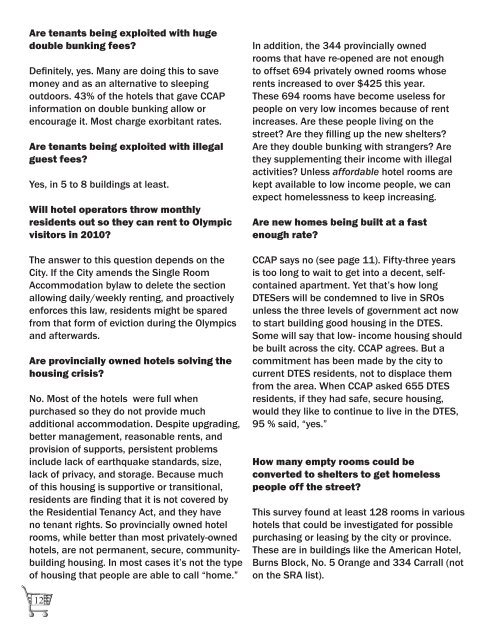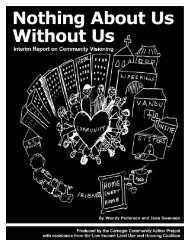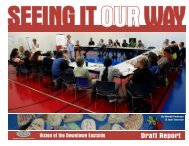Still Losing Hotel Rooms - Carnegie Community Action Project
Still Losing Hotel Rooms - Carnegie Community Action Project
Still Losing Hotel Rooms - Carnegie Community Action Project
Create successful ePaper yourself
Turn your PDF publications into a flip-book with our unique Google optimized e-Paper software.
Are tenants being exploited with huge<br />
double bunking fees?<br />
Definitely, yes. Many are doing this to save<br />
money and as an alternative to sleeping<br />
outdoors. 43% of the hotels that gave CCAP<br />
information on double bunking allow or<br />
encourage it. Most charge exorbitant rates.<br />
Are tenants being exploited with illegal<br />
guest fees?<br />
Yes, in 5 to 8 buildings at least.<br />
Will hotel operators throw monthly<br />
residents out so they can rent to Olympic<br />
visitors in 2010?<br />
The answer to this question depends on the<br />
City. If the City amends the Single Room<br />
Accommodation bylaw to delete the section<br />
allowing daily/weekly renting, and proactively<br />
enforces this law, residents might be spared<br />
from that form of eviction during the Olympics<br />
and afterwards.<br />
Are provincially owned hotels solving the<br />
housing crisis?<br />
No. Most of the hotels were full when<br />
purchased so they do not provide much<br />
additional accommodation. Despite upgrading,<br />
better management, reasonable rents, and<br />
provision of supports, persistent problems<br />
include lack of earthquake standards, size,<br />
lack of privacy, and storage. Because much<br />
of this housing is supportive or transitional,<br />
residents are finding that it is not covered by<br />
the Residential Tenancy Act, and they have<br />
no tenant rights. So provincially owned hotel<br />
rooms, while better than most privately-owned<br />
hotels, are not permanent, secure, communitybuilding<br />
housing. In most cases it’s not the type<br />
of housing that people are able to call “home.”<br />
12<br />
In addition, the 344 provincially owned<br />
rooms that have re-opened are not enough<br />
to offset 694 privately owned rooms whose<br />
rents increased to over $425 this year.<br />
These 694 rooms have become useless for<br />
people on very low incomes because of rent<br />
increases. Are these people living on the<br />
street? Are they filling up the new shelters?<br />
Are they double bunking with strangers? Are<br />
they supplementing their income with illegal<br />
activities? Unless affordable hotel rooms are<br />
kept available to low income people, we can<br />
expect homelessness to keep increasing.<br />
Are new homes being built at a fast<br />
enough rate?<br />
CCAP says no (see page 11). Fifty-three years<br />
is too long to wait to get into a decent, selfcontained<br />
apartment. Yet that’s how long<br />
DTESers will be condemned to live in SROs<br />
unless the three levels of government act now<br />
to start building good housing in the DTES.<br />
Some will say that low- income housing should<br />
be built across the city. CCAP agrees. But a<br />
commitment has been made by the city to<br />
current DTES residents, not to displace them<br />
from the area. When CCAP asked 655 DTES<br />
residents, if they had safe, secure housing,<br />
would they like to continue to live in the DTES,<br />
95 % said, “yes.”<br />
How many empty rooms could be<br />
converted to shelters to get homeless<br />
people off the street?<br />
This survey found at least 128 rooms in various<br />
hotels that could be investigated for possible<br />
purchasing or leasing by the city or province.<br />
These are in buildings like the American <strong>Hotel</strong>,<br />
Burns Block, No. 5 Orange and 334 Carrall (not<br />
on the SRA list).




